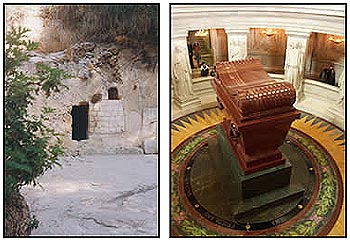A Contrast in Tombs
Tombs Can Tell a Story

One of my favorite places in the Holy Land is the site called the Garden Tomb. It is located in Jerusalem just a couple of blocks north of the Old City’s Damascus Gate.
It is often referred to as “the Protestant site” of the crucifixion and burial of the Lord. That’s because the Church of the Holy Sepulchre, a Catholic Church, stands on the more traditional site that is located within the walls of the Old City.
The Garden Tomb is also sometimes called “Gordon’s Calvary” because the site was discovered by a British army general by the name of Gordon.
Whether or not the Garden Tomb is the authentic site of Jesus’ death and burial is really irrelevant. All agree that it captures the essence of the site as it is described in the Gospels. It is located next to a craggy hill in which can be seen the outline of a skull. The garden contains a First Century tomb that is chiseled from solid rock, and it has a trough in front for a rolling stone to seal it.
The simplicity of the tomb and the beauty of the garden are simply overwhelming. It is awesome to sit there and contemplate the fact that the Son of God was buried in a place like this. It brings to mind the words of Paul in Philippians 2 where he wrote these words about Jesus: “though He existed in the form of God, He did not regard equality with God a thing to be grasped, but emptied Himself, taking the form of a bond-servant.”
This year on our way home from Israel, our pilgrimage group stopped off for three days in Paris. One of the most remarkable sites we visited there was the tomb of Napoleon.
Napoleon’s tomb is the epitome of splendor. It is located at the rear of a cathedral beneath a colossal gold plated dome. As you enter the room, all you see at first is a circular railing that surrounds a hole in the floor that is about one hundred feet across. You must lean over the railing and look down to see the actual tomb. It is located one floor below inside a majestic sarcophagus carved from a rare, dark brown stone. As our group stood at the railing looking at the tomb, the first response uttered by anyone was a humorous one: “Wow! This guy really had a Napoleon complex!”
But the humor quickly faded from my thoughts, for the Lord began to impress upon my heart the contrast between the tombs of Napoleon and Jesus. And as I meditated upon the tombs, I began to think about the differences in the lives.
One man surrendered the glory of Heaven to become a suffering servant. He reached out to people in love and compassion, feeding and healing them. When they demanded that He become their king, He rejected the offer and chose instead to give His life for their sins. He was buried in a borrowed tomb.
The other man rose from rags to riches. In the process, he manipulated people and used them as cannon fodder. His megalomania led him to crown himself as Emperor. Millions died for him or because of him. He specified that his glorious tomb was to be designed in such a way as to require people to bow before it (which you must do as you lean over the railing to look down at it!).
When Jesus was asked to define the fundamental guideline for life, He said, “You are to love the Lord your God with all your heart and mind and soul.” One of Napoleon’s contemporaries wrote that when the Emperor entered a room everyone could see written on his face the words, “Thou shalt have no other god but me.”
What a contrast in lives. How that contrast is reflected in the respective tombs.
Which man is honored by the world? The arrogant one who lusted for power. His name is synonymous with splendor and majesty. The other man, the one who chose the path of sacrificial love and humility, is despised by the world. His name is a curse word.
And so it is that as I stood at the tomb of Napoleon, I came to a fuller realization of what the Scripture means when it says, “Do not love the world nor the things in the world. If anyone loves the world, the love of the Father is not in him.” (I John 2:15)
What about you? Whom do you admire? Are your heroes the people of the world like Donald Trump, Madonna, and Nelson Mandela? Do you love the world or do you love the Lord?
One final thought. There are many contrasts between the tombs of Napoleon and Jesus, but the most significant one, the one that makes all the difference, is that the tomb of Jesus is empty. Praise God!




